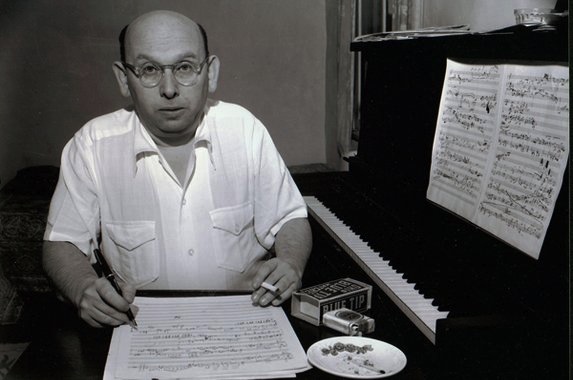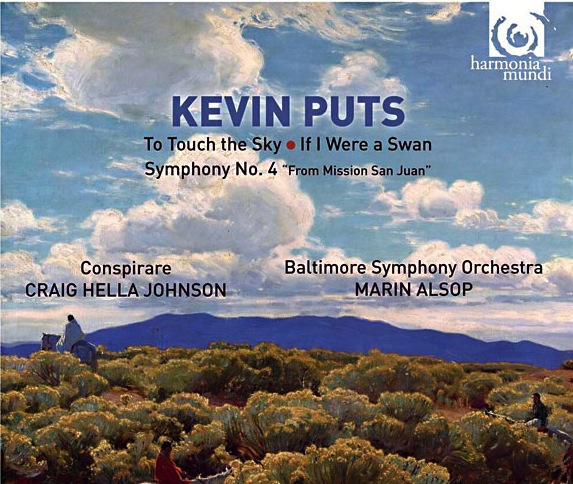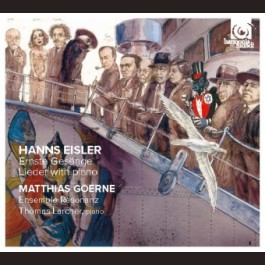Classical CD Reviews: Kevin Puts — Choral Music, Symphony no. 4 and Hanns Eisler — Songs (Harmonia Mundi)
New discs from Harmonia Mundi: One explores the music of Pulitzer prize-winner Kevin Puts, the other focuses on the songs of Hanns Eisler, and it is one of the most fascinating albums to come from any label so far this year.
Kevin Puts: Choral Music, Symphony no. 4 and Hanns Eisler: Songs (Harmonia Mundi)
By Jonathan Blumhofer
Yonkers, New York-based composer Kevin Puts is one of the most prominent names of the younger generation of contemporary composers. The 2012 Pulitzer Prize winner’s music is the focus of new disc from Harmonia Mundi that showcases his choral and orchestral activities over the last few years.
The two choral selections, If I Were a Swan and To Touch the Sky, are given absorbing performances by the Austin, TX-based ensemble Conspirare and conductor Craig Hella Johnson. Puts has a marvelous way with words: he knows how to set them in a way that catches the ear and enhances their meaning, yet, despite his use of abundant contemporary techniques – haunting, blocked sonorities; Minimalist patterns; and the like – his settings achieve a direct expression reminiscent of established masters.
If I Were a Swan, Puts’ setting of Fleda Brown’s poem of the same name, proves a haunting opener, marrying rich, contrapuntal figures with pulsing gestures that recall the opening of John Adams’s Harmonium. To Touch the Sky is an altogether more ambitious score, lasting nearly half an hour, drawing on texts that focus on the “divine feminine.” Featuring poetry by Maria Howe, Mother Theresa, Sappho, and Hildegard von Bingen (among others), it’s an evocative piece that traces an arc from brightness (Howe’s “Annunciation [Magnificat]”) to darkness (Edna St. Vincent Millay’s “Epitaph”) and back again. Conspirare’s performances of both are filled with detail, expressive and dynamic, and are easily convincing, whether navigating Puts’ chant-like settings or his soaring, melismatic writing.
Puts’ Symphony no. 4, “From Mission San Juan,” fills out the disc. Written for the Cabrillo Festival of Contemporary Music in Santa Cruz, CA, it’s a piece that endeavors to explore the musical history of one of the Festival’s main venues, the Mission church San Juan Bautista. Accordingly, it incorporates elements of the acoustics of the Mission into its first movement; imagined melodies to represent the area’s indigenous Mutsun Indians in the second; the hymnody of the Mission’s friars in the third; and a “healing” finale that combines the music of the friars and the Indians “as one.”
It’s an ambitious piece, one with plenty of rewarding moments (including a serenely beautiful opening to its fourth movement), but I never got the sense that it fully lived up to its noble goals. For all its ear-catching passages, there are at least as many dry patches. It’s a composition that calls to mind better efforts in the genre by other composers: Puts’ faux Mutsun tunes in the second movement recall Copland’s far more memorable treatment of Central American influences in Danzon Cubano and El salón Mexico; and the big, cinematic reconciliation music of the finale recalls Bernstein’s Age of Anxiety and Kaddish symphonies, but it lacks Bernstein’s conviction. The Baltimore Symphony under Marin Alsop (who is also music director of the Cabrillo Festival) delivers some fine, intense playing throughout the symphony’s near thirty-minute duration, but it’s a score that, on record at least, leaves only a superficial impression.
Few composers have led more difficult lives – or, at least, lead them in rougher, grimmer places – than Hanns Eisler. Born in 1898 at the height of the Second Reich, Eisler, a Jew, Communist, and Schoenberg disciple, settled in the United States in 1938 and made a living mostly by composing film scores during the Second World War. In 1948, though, he was denounced to the House Committee on Un-American Activities by, among others, his sister, Ruth Fischer, and was forced to leave the U.S., settling in East Germany, where he died fourteen years later.
Eisler’s disillusionment with the Soviet Union (though he remained a committed Communist until his death) is reflected in his Ernste Gesänge (“Serious Songs”), completed shortly before his death in 1962. This brief song cycle (not quite fifteen minutes in length) receives a searing performance from baritone Matthias Goerne and Ensemble Resonanz in HM’s brilliant new all-Eisler album. It’s perhaps not surprising that a former student of Schoenberg’s could condense so much expression into so short a piece, yet this is what Eisler accomplished in what is a packed meditation on his life and beliefs. Goerne, whose recordings of Schubert lieder on HM have been nothing short of stunning, imbues his performance with the deepest expression and the strings accompanying him deliver a finely nuanced reading of Eisler’s spastic writing, which jumps from wild, Expressionist gestures to lush lyricism and back again, on a dime.

Composer Hanns Eisler — his music could jump from wild, Expressionist gestures to lush lyricism and back again, on a dime.
Goerne’s equally at home in the album’s somewhat lighter fare, the Lieder mit Klavier, that sets poems by Bertolt Brecht. These are mostly short pieces – the longest lasts only about four minutes – but they’re sung with such focus and attention to detail that they feel profoundly significant. There’s a Weill-esque quality to some of Eisler’s melodic sensibilities, but on the whole his music is darker and bitterer, making his music perhaps an even more ideal companion for Brecht’s lyrics.
And to fill out this substantive Eisler disc, pianist Thomas Larcher (who accompanies Goerne on the aforementioned Lieder) delivers a knockout performance of the First Piano Sonata. Written in the early 1920s, the influence of the pre-Serial Schoenberg is very clear here, with beautiful, disjunct melodic writing and a pungent sense of harmonic development. It’s gripping music played with the greatest conviction and a powerful capstone to one of the most fascinating albums to come from any label yet this year.
Jonathan Blumhofer is a composer and violist who has been active in the greater Boston area since 2004. His music has received numerous awards and been performed by various ensembles, including the American Composers Orchestra, Kiev Philharmonic, Camerata Chicago, Xanthos Ensemble, and Juventas New Music Group. Since receiving his doctorate from Boston University in 2010, Jon has taught at Clark University, Worcester Polytechnic Institute, and online for the University of Phoenix, in addition to writing music criticism for the Worcester Telegram & Gazette.
Tagged: Hanns Eisler, Hanns Eisler: Songs, Harmonia Mundi, Kevin Puts, Kevin Puts: Choral Music, Matthias Goerne, Symphony no. 4


